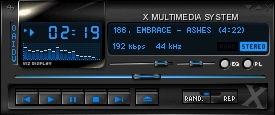
Ogg is a free, open container format maintained by the Xiph.Org Foundation. The authors of the Ogg format state that it is unrestricted by software patents and is designed to provide for efficient streaming and manipulation of high-quality digital multimedia. Its name is derived from "ogging", jargon from the computer game Netrek.

Vorbis is a free and open-source software project headed by the Xiph.Org Foundation. The project produces an audio coding format and software reference encoder/decoder (codec) for lossy audio compression, libvorbis. Vorbis is most commonly used in conjunction with the Ogg container format and it is therefore often referred to as Ogg Vorbis.

X Multimedia System (XMMS) is an audio player for Unix-like systems released under a free software license.
RealAudio, also spelled Real Audio, is a proprietary audio format developed by RealNetworks and first released in April 1995. It uses a variety of audio codecs, ranging from low-bitrate formats that can be used over dialup modems, to high-fidelity formats for music. It can be used as a streaming audio format, that is played at the same time as it is downloaded.
Helix DNA was a project to produce computer software that can play audio and video media in various formats and aid in creating such media. It is intended as a largely free and open-source digital media framework that runs on numerous operating systems and processors and it was started by RealNetworks, which contributed much of the code. The Helix Community was an open collaborative effort to develop and extend the Helix DNA platform. The Helix Project has been discontinued.
Xiph.Org Foundation is a nonprofit organization that produces free multimedia formats and software tools. It focuses on the Ogg family of formats, the most successful of which has been Vorbis, an open and freely licensed audio format and codec designed to compete with the patented WMA, MP3 and AAC. As of 2013, development work was focused on Daala, an open and patent-free video format and codec designed to compete with VP9 and the patented High Efficiency Video Coding.
Shoutcast is a service for streaming media over the internet to media players, using its own cross-platform proprietary software. It allows digital audio content, primarily in MP3 or High-Efficiency Advanced Audio Coding format. The most common use of Shoutcast is for creating or listening to Internet audio broadcasts; however, there are also video streams. The software is available to use for free or as a paid cloud service with additional professional features.

High-Efficiency Advanced Audio Coding (HE-AAC) is an audio coding format for lossy data compression of digital audio defined as an MPEG-4 Audio profile in ISO/IEC 14496–3. It is an extension of Low Complexity AAC (AAC-LC) optimized for low-bitrate applications such as streaming audio. The usage profile HE-AAC v1 uses spectral band replication (SBR) to enhance the modified discrete cosine transform (MDCT) compression efficiency in the frequency domain. The usage profile HE-AAC v2 couples SBR with Parametric Stereo (PS) to further enhance the compression efficiency of stereo signals.

Altacast is a free and open-source audio encoder that can be used to create Internet streams of varying types. Many independent and commercial broadcasters use Altacast to create Internet radio stations, such as those listed on the Icecast, Loudcaster and Shoutcast station directories.
Music Player Daemon (MPD) is a free and open source music player server. It plays audio files, organizes playlists and maintains a music database. In order to interact with it, a client program is needed. The MPD distribution includes mpc, a simple command line client.

Music On Console (MOC) is an ncurses-based console audio player for Linux/UNIX. It was originally written by Damian Pietras, and is currently maintained by John Fitzgerald. It is designed to be powerful and easy to use, with an interface inspired by the Midnight Commander console file manager. The default interface layout comprises a file list in the left pane with the playlist on the right. It is configurable with customizable key bindings, color schemes and interface layouts. MOC comes with several themes defined in text files, which can be modified to create new layouts. It supports ALSA, OSS or JACK outputs.

Cmus is a small, fast console audio player for Unix-like operating systems. cmus is distributed under the terms of the GPL-2.0-or-later and is operated exclusively through a text-based user interface, built with ncurses.

K-Multimedia Player is an Adware-supported media player for Windows and iOS that can play most current audio and video formats, including VCD, HDML, DVD, AVI, MKV, Ogg, OGM, 3GP, MPEG-1/2/4, AAC, WMA 7, 8, WMV, RealMedia, FLV and QuickTime.

Simplified Universal Player Encoder & Recorder (SUPER) is a closed-source front end for open-source software video players and encoders provided by the FFmpeg, MEncoder, MPlayer, x264, ffmpeg2theora, musepack, Monkey's Audio, True Audio, WavPack, libavcodec, and the Theora/Vorbis RealProducer plugIn projects. It was first released in 2005. SUPER provides a graphical user interface to these back-end programs, which use a command-line interface.
The Helix Universal Media Server was a product developed by RealNetworks and originates from the first streaming media server originally developed by Progressive Networks in 1994. It supported a variety of streaming media delivery transports including MPEG-DASH RTMP (flash), RTSP (standard), HTTP Live Streaming (HLS), Microsoft Silverlight and HTTP Progressive Download enabling mobile phone OS and PC OS media client delivery.

Opus is a lossy audio coding format developed by the Xiph.Org Foundation and standardized by the Internet Engineering Task Force, designed to efficiently code speech and general audio in a single format, while remaining low-latency enough for real-time interactive communication and low-complexity enough for low-end embedded processors. Opus replaces both Vorbis and Speex for new applications, and several blind listening tests have ranked it higher-quality than any other standard audio format at any given bitrate until transparency is reached, including MP3, AAC, and HE-AAC.
HTML5 Audio is a subject of the HTML5 specification, incorporating audio input, playback, and synthesis, as well as in the browser. iOS

DeaDBeeF is an audio player software available for Windows, Linux and other Unix-like operating systems. An ad-supported Android version is available, but has not been updated since 2017. DeaDBeeF is free and open-source software, except on Android.










